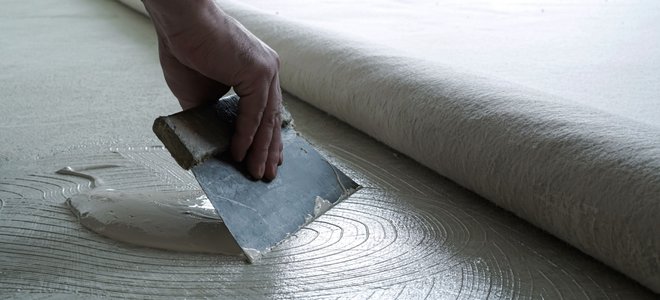Glued-Down Carpet: When and Why It's the Right Choice
Ever wondered why some carpets are glued down instead of being stretched and tacked? Choosing the right installation method is crucial for carpet longevity and overall appearance. This article explores the various reasons for opting for a glued-down carpet installation, delving into the pros, cons, and situations where it shines.
Adhering carpet directly to the subfloor offers several advantages, making it a popular choice in certain settings. From high-traffic commercial spaces to unique residential applications, understanding the motivations behind glue-down installations can help you make informed flooring decisions.
Historically, carpet installation methods have evolved. Early carpets were often loose-laid or tacked down, but as adhesive technology advanced, glue-down installation gained traction. This method offered a more secure and stable flooring solution, especially in areas subject to heavy use. Gluing provides superior dimensional stability, preventing wrinkles, buckling, and shifting over time, contributing significantly to the carpet's lifespan and appearance. This method is also crucial for certain carpet types like carpet tiles, which rely on adhesive for proper installation.
The importance of choosing the right installation method – glue-down versus stretched and tacked – cannot be overstated. Selecting the appropriate method impacts the carpet's durability, its aesthetic appeal, and the overall cost of ownership. An incorrect installation can lead to premature wear, unsightly ripples, and even costly repairs down the line.
One of the main considerations when deciding on a glued-down installation relates to the subfloor. Concrete subfloors are often ideal for direct glue-down applications. The smooth, level surface provides a perfect base for even adhesive distribution, ensuring a secure bond. Certain types of carpet, like indoor/outdoor carpet, are specifically designed for glue-down installations, further highlighting the importance of material compatibility.
Gluing carpet directly to the floor provides several benefits. First, it enhances dimensional stability, preventing the carpet from shifting, stretching, or buckling, even under heavy foot traffic. Second, it facilitates the installation of carpet tiles, which are particularly popular in commercial settings. Third, glue-down installations are often more cost-effective in large spaces as they eliminate the need for tack strips and stretching equipment.
Preparing for a glue-down carpet installation involves ensuring the subfloor is clean, dry, and level. Any imperfections or debris can compromise the bond between the adhesive and the carpet backing.
If considering a glue-down carpet installation, consult with a flooring professional. They can assess your specific needs and recommend the best adhesive and installation method for your chosen carpet and subfloor.
Advantages and Disadvantages of Glued-Down Carpet
| Advantages | Disadvantages |
|---|---|
| Enhanced dimensional stability | More difficult removal |
| Ideal for carpet tiles | Requires a smooth, level subfloor |
| Cost-effective in large spaces | Potential for moisture issues if not installed correctly |
Best Practices for Glue-Down Carpet Installation:
1. Ensure a clean, dry, and level subfloor.
2. Use the appropriate adhesive recommended for your carpet type.
3. Apply adhesive evenly to prevent bubbling or uneven adhesion.
4. Allow adequate drying time before placing furniture on the newly installed carpet.
5. Follow manufacturer’s instructions for both the carpet and the adhesive.
Frequently Asked Questions:
1. Is glued-down carpet suitable for all subfloors? No, it is most suitable for smooth, level subfloors like concrete.
2. Can I install glued-down carpet myself? While possible, it is recommended to hire a professional for optimal results.
3. What type of adhesive is used for glue-down installations? The type of adhesive varies depending on the carpet and subfloor.
4. How long does it take for the adhesive to dry? Drying times vary, but it's crucial to follow the manufacturer's instructions.
5. Can glued-down carpet be removed? Yes, but it can be more challenging than removing tacked-down carpet.
6. Is glued-down carpet more expensive? Not necessarily. In large areas, it can be more cost-effective than traditional installation.
7. What are the best carpet types for glue-down installation? Carpet tiles and indoor/outdoor carpets are often glued down.
8. How do I maintain glued-down carpet? Regular vacuuming and professional cleaning are recommended.
Tips and Tricks: Ensure proper ventilation during installation. Test the adhesive in an inconspicuous area before full application.
In conclusion, understanding the reasons behind choosing a glued-down carpet installation is essential for making informed decisions about your flooring. While not suitable for all situations, glue-down installation offers distinct advantages in terms of stability, durability, and suitability for certain carpet types and applications. By weighing the pros and cons and considering the specific requirements of your space, you can determine whether adhering your carpet directly to the subfloor is the best choice for your needs. Consider consulting with a flooring professional for expert guidance on selecting the appropriate installation method for your next project. This proactive approach ensures the longevity and beauty of your new flooring, maximizing your investment and enjoying a beautiful, functional space for years to come. This knowledge empowers you to make the best choice for your flooring needs, considering factors like budget, traffic, and desired aesthetic. Investing time in research and planning will ultimately lead to a more satisfying and durable flooring solution.
Unlocking the mystery the pen behind pilgrims progress
Unlocking tiny minds the power of kindergarten math worksheets
Portada para power point para quimica captivating chemistry presentations














